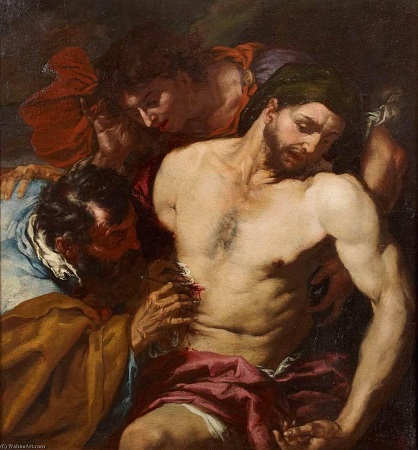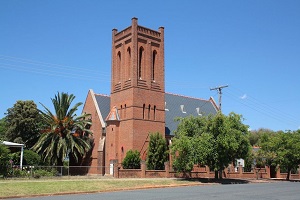|
Bij de vijfde zondag na Pinksteren

De barmhartige Samaritaan door Giovanni Battista Langetti, 1670
The Good Samaritan
HE comes from out the ages dim—
The good Samaritan;
I somehow never pictured him
A fat and jolly man;
But one who'd little joy to glean,
And little coin to give—
A sad-faced man, and lank and lean,
Who found it hard to live.
His eyes were haggard in the drought,
His hair was iron-grey—
His dusty gown was patched, no doubt,
Where we patch pants to-day.
His faded turban, too, was torn—
But darned and folded neat,
And leagues of desert sand had worn
The sandals on his feet.
He's been a fool, perhaps, and would
Have prospered had he tried,
But he was one who never could
Pass by the other side.
An honest man whom men called soft,
While laughing in their sleeves—
No doubt in business ways he oft
Had fallen amongst thieves.
And, I suppose, by track and tent,
And other ancient ways,
He drank, and fought, and loved, and went
The pace in his young days.
And he had known the bitter year
When love and friendship fail—
I wouldn't be surprised to hear
That he had been in jail.
A silent man, whose passions slept,
Who had no friends or foes—
A quiet man, who always kept
His hopes and sorrows close.
A man who very seldom smiled,
And one who could not weep
Be it for death of wife or child
Or sorrow still more deep.
But sometimes when a man would rave
Of wrong, as sinners do,
He'd say to cheer and make him brave
‘I've had my troubles too.’
(They might be twittered by the birds,
And breathed high Heaven through,
There's beauty in those world-old words:
‘I've had my sorrows too.’)
And if he was a married man,
As many are that roam,
I guess that good Samaritan
Was rather glum at home,
Impatient when a child would fret,
And strict at times and grim—
A man whose kinsmen never yet
Appreciated him.
Howbeit—in a study brown—
He had for all we know,
His own thoughts as he journeyed down
The road to Jericho,
And pondered, as we puzzle yet,
On tragedies of life—
And maybe he was deep in debt
And parted from his wife.
(And so ‘by chance there came that way,’
It reads not like romance—
The truest friends on earth to-day,
They mostly come by chance.)
He saw a stranger left by thieves
Sore hurt and like to die—
He also saw (my heart believes)
The others pass him by.
(Perhaps that good Samaritan
Knew Levite well, and priest)
He lifted up the wounded man
And sat him on his beast,
And took him on towards the inn—
All Christ-like unawares—
Still pondering, perhaps, on sin
And virtue—and his cares.
He bore him in and fixed him right
(Helped by the local drunk),
And wined and oiled him well all night,
And thought beside his bunk.
And on the morrow ere he went
He left a quid and spoke
Unto the host in terms which meant—
‘Look after that poor bloke.’
He must have known them at the inn,
They must have known him too—
Perhaps on that same track he'd seen
Some other sick mate through;
For ‘Whatsoe'er thou spendest more’
(The parable is plain)
‘I will repay,’ he told the host,
‘When I return again.’
He seemed to be a good sort, too,
The boss of that old pub—
(As even now there are a few
At shanties in the scrub).
The good Samaritan jogged on
Through Canaan's dust and heat,
And pondered over various schemes
And ways to make ends meet.
*****
He was no Christian, understand,
For Christ had not been born—
He journeyed later through the land
To hold the priests to scorn;
And tell the world of ‘certain men’
Like that Samaritan,
And preach the simple creed again—
Man's duty! Man to man!
*****
‘Once on a time there lived a man,’
But he has lived alway,
And that gaunt, good Samaritan
Is with us here to-day;
He passes through the city streets
Unnoticed and unknown,
He helps the sinner that he meets—
His sorrows are his own.
He shares his tucker on the track
When things are at their worst
(And often shouts in bars outback
For souls that are athirst).
To-day I see him staggering down
The blazing water-course,
And making for the distant town
With a sick man on his horse.
He'll live while nations find their graves
And mortals suffer pain—
When colour rules and whites are slaves
And savages again.
And, after all is past and done,
He'll rise up, the Last Man,
From tending to the last but one—
The good Samaritan.

Henry Lawson (17 juni 1867 – 2 september 1922)
De Anglicaanse Holy TrinityChurch in Grenfell, New South Wales, de geboorteplaats van Henry Lawson
Zie voor de schrijvers van de 14e juli ook mijn volgende twee blogs van vandaag.
|



